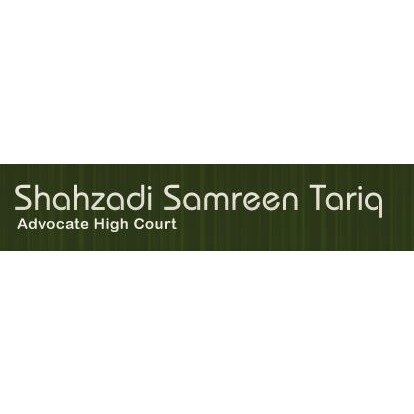Best Sexual Harassment Lawyers in Pakistan
Share your needs with us, get contacted by law firms.
Free. Takes 2 min.
Or refine your search by selecting a city:
List of the best lawyers in Pakistan
About Sexual Harassment Law in Pakistan
Sexual harassment is a persistent issue in Pakistan, affecting people in various aspects of life, including workplaces and educational environments. The Pakistani government has taken steps to address this issue through legislation aimed at preventing harassment and providing victims with a means of obtaining justice. The Protection Against Harassment of Women at the Workplace Act, 2010, is the central legal framework addressing this issue, offering recourse and protection to individuals who experience sexual harassment in professional settings. Furthermore, amendments to the Pakistan Penal Code and other relevant laws have reinforced the penalties and procedural protections against such offenses.
Why You May Need a Lawyer
Seeking legal assistance in cases of sexual harassment is crucial for several reasons. Firstly, victims may find it challenging to navigate legal procedures and present their case effectively without professional help. Secondly, a lawyer can provide expert advice on the strength of your case and the potential remedies available. Additionally, legal representation can ensure that your rights are protected throughout the process, especially in confronting powerful adversaries or organizations. Finally, lawyers can facilitate negotiations or settlements, providing a resolution that is in the victim's best interest.
Local Laws Overview
Sexual harassment in Pakistan is primarily governed by the Protection Against Harassment of Women at the Workplace Act, 2010. This Act defines sexual harassment broadly, covering unsolicited and unwelcome sexual advances, requests for sexual favors, and other verbal or physical conduct of a sexual nature. Under this Act, organizations are required to establish internal committees to address complaints of harassment and are obliged to implement a code of conduct prescribed by the law.
The Act also prescribes penalties ranging from censures to dismissal, and monetary fines against perpetrators. Additionally, the Pakistan Penal Code includes provisions that criminalize various forms of sexual harassment, including Section 509, which pertains to the use of words, gestures, or acts intended to insult a woman’s modesty. The legal framework in Pakistan is extensive, aiming to provide adequate protection and remedies to those affected.
Frequently Asked Questions
What is considered sexual harassment under Pakistani law?
Sexual harassment includes unwelcome sexual advances, requests for sexual favors, and other verbal or physical conduct of a sexual nature that affects a person's employment or creates a hostile work environment.
Where can I file a complaint about sexual harassment?
You can file a complaint with your workplace's internal harassment committee, a relevant governmental body like the Ombudsman, or directly with the police if the harassment involves criminal elements.
What should I do if my workplace doesn't have a harassment committee?
If your workplace lacks a committee, you can approach the Office of the Ombudsman for Women or seek recourse through other legal channels provided by the government.
What protection does the law offer to whistleblowers?
The law provides confidentiality for victims and witnesses who report sexual harassment, aiming to protect them from retaliation and victimization.
How long does the legal process take?
The duration can vary greatly depending on the specifics of the case, available evidence, and the efficiency of the legal system at the time. Typically, it can take several months to resolve.
Can men also file cases of sexual harassment?
Yes, while the law mainly focuses on women, men can also report sexual harassment in certain contexts where they feel they have been victimized.
Is mediation a possible solution in sexual harassment cases?
Mediation might be proposed as an option to resolve the issue without formal legal proceedings, but it must be agreed upon by all parties involved.
Can I claim compensation for damages due to harassment?
Yes, under the law, victims can seek compensation for emotional distress and other damages resulting from the harassment.
What evidence is needed to support a harassment claim?
Evidence can include messages, emails, witness testimonies, and any other documentation or recordings that demonstrate the harassment occurred.
What should I do if my complaint is dismissed?
If your complaint is dismissed, you may have a right to appeal the decision. Consulting a lawyer can help you understand and navigate the appeals process.
Additional Resources
For legal support and resources, individuals can reach out to various organizations and governmental bodies such as the National Commission on the Status of Women, the Office of the Ombudsman, and local NGOs specializing in women's rights and legal aid. Additionally, informational brochures and online resources provided by these bodies can offer guidance and assistance to those affected by sexual harassment.
Next Steps
If you require legal assistance for a sexual harassment issue, start by documenting your experience thoroughly. Gather any evidence that supports your claim, such as emails, messages, or witness accounts. Seek advice from a qualified lawyer who specializes in sexual harassment cases to discuss your options. It is also beneficial to familiarize yourself with your organization's harassment policies and the established procedures for filing a complaint. With professional legal support, you can navigate the legal system more effectively to seek justice and protection.
Lawzana helps you find the best lawyers and law firms in Pakistan through a curated and pre-screened list of qualified legal professionals. Our platform offers rankings and detailed profiles of attorneys and law firms, allowing you to compare based on practice areas, including Sexual Harassment, experience, and client feedback.
Each profile includes a description of the firm's areas of practice, client reviews, team members and partners, year of establishment, spoken languages, office locations, contact information, social media presence, and any published articles or resources. Most firms on our platform speak English and are experienced in both local and international legal matters.
Get a quote from top-rated law firms in Pakistan — quickly, securely, and without unnecessary hassle.
Disclaimer:
The information provided on this page is for general informational purposes only and does not constitute legal advice. While we strive to ensure the accuracy and relevance of the content, legal information may change over time, and interpretations of the law can vary. You should always consult with a qualified legal professional for advice specific to your situation.
We disclaim all liability for actions taken or not taken based on the content of this page. If you believe any information is incorrect or outdated, please contact us, and we will review and update it where appropriate.
Browse sexual harassment law firms by city in Pakistan
Refine your search by selecting a city.

















